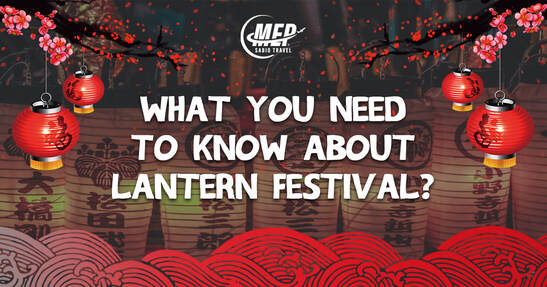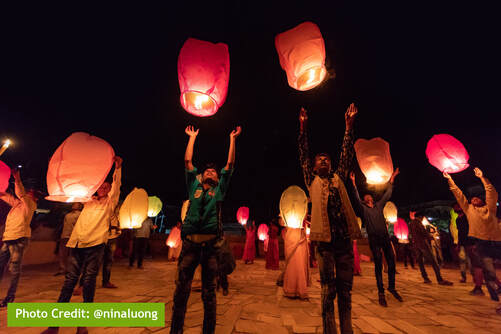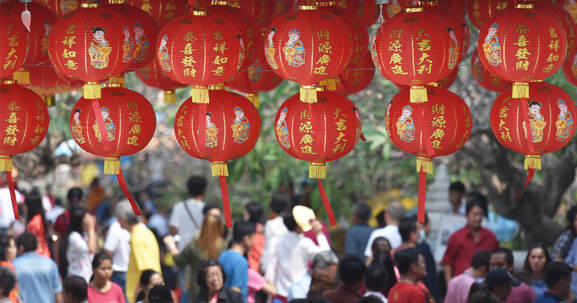The Lantern Festival, or the Spring Lantern Festival also known as the Yuan Xiao Festival, is a holiday celebrated in China and other Asian countries that celebrates the lunar calendar's deceased ancestors on the fifteenth day of the first month. Lantern Festival aims at fostering unity, harmony, and forgiveness. It also features lion and dragon dances, parades, and fireworks. During the celebration, small glutinous rice balls filled with fruits and nuts, called yuanxiao or tangyuan are eaten.
Origin of legends
The celebration may originate from as far earlier as the Han dynasty (206 BCE to 220 CE), when Buddhist monks would light lanterns in honor of the Buddha on the 15th day of the lunar year. He ordered the palace and temples to light candles, and hang lanterns for the citizens. Eventually developed into the Festival of Lanterns we know today.
Origin of legends
The celebration may originate from as far earlier as the Han dynasty (206 BCE to 220 CE), when Buddhist monks would light lanterns in honor of the Buddha on the 15th day of the lunar year. He ordered the palace and temples to light candles, and hang lanterns for the citizens. Eventually developed into the Festival of Lanterns we know today.
Searching for love
Young people were escorted into the streets in the early days in hopes of finding love. Matchmakers participated feverishly in matching couples' dreams. The brightest lanterns symbolize good fortune and hope.
Lantern Riddles
Through debating the often different meanings of the words and phrases that make up the riddle, people will guess the answer. A tip may be given, such as whether a person, location, object, or reasoning as the answer. Solving these riddles is seen as a very difficult task, involving a tiger's will. Therefore, lantern riddles were also called "lantern tiger," or "literary tiger," or "lantern tiger," as well as "shooting the literary tiger," solving riddles.
Young people were escorted into the streets in the early days in hopes of finding love. Matchmakers participated feverishly in matching couples' dreams. The brightest lanterns symbolize good fortune and hope.
Lantern Riddles
Through debating the often different meanings of the words and phrases that make up the riddle, people will guess the answer. A tip may be given, such as whether a person, location, object, or reasoning as the answer. Solving these riddles is seen as a very difficult task, involving a tiger's will. Therefore, lantern riddles were also called "lantern tiger," or "literary tiger," or "lantern tiger," as well as "shooting the literary tiger," solving riddles.
Here are a few riddles to enjoy:
1) I can follow you for thousands of miles and not miss home. I do not fear cold or fire, and I desire neither food nor drink. But I disappear when the sun sets behind the western mountains. Who am I?
2) They look like twin brothers, both sturdy and tall. They work together and go everywhere together. But they only go near solid food and do not care for soup. Who are they?
3) Use the 10 letters ACDEHIJLNP to spell out the names of four countries. Each name must be five letters long, and the four countries must be neighbours.
4) This lovely maiden eats no meat but eats leaves. She labours each day spinning and weaving for the benefit of others. Who is she?
5) He devotes his life to looking after the house. His mate always follows when the master goes out. A gentleman sees him and goes away. A villain sees him and it spells bad luck. Who is he?
Answers:
1) Your shadow.
2) A pair of chopsticks.
3) JAPAN, CHINA, NEPAL, INDIA.
4) A silkworm.
5) A lock. If a gentleman sees it, he knows that somehow the master is away, and he's going to leave later and come back. He'll pry it open when a villain sees it, and break it into the house.
1) I can follow you for thousands of miles and not miss home. I do not fear cold or fire, and I desire neither food nor drink. But I disappear when the sun sets behind the western mountains. Who am I?
2) They look like twin brothers, both sturdy and tall. They work together and go everywhere together. But they only go near solid food and do not care for soup. Who are they?
3) Use the 10 letters ACDEHIJLNP to spell out the names of four countries. Each name must be five letters long, and the four countries must be neighbours.
4) This lovely maiden eats no meat but eats leaves. She labours each day spinning and weaving for the benefit of others. Who is she?
5) He devotes his life to looking after the house. His mate always follows when the master goes out. A gentleman sees him and goes away. A villain sees him and it spells bad luck. Who is he?
Answers:
1) Your shadow.
2) A pair of chopsticks.
3) JAPAN, CHINA, NEPAL, INDIA.
4) A silkworm.
5) A lock. If a gentleman sees it, he knows that somehow the master is away, and he's going to leave later and come back. He'll pry it open when a villain sees it, and break it into the house.
YOU MAY ALSO LIKE


